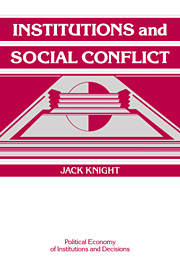Book contents
- Frontmatter
- Contents
- Series editors' preface
- Preface
- CHAPTER 1 INTRODUCTION
- CHAPTER 2 THE PRIMARY IMPORTANCE OF DISTRIBUTIONAL CONFLICT
- CHAPTER 3 INSTITUTIONS AND STRATEGIC CHOICE: INFORMATION, SANCTIONS, AND SOCIAL EXPECTATIONS
- CHAPTER 4 THE SPONTANEOUS EMERGENCE OF SOCIAL INSTITUTIONS: CONTEMPORARY THEORIES OF INSTITUTIONAL CHANGE
- CHAPTER 5 THE SPONTANEOUS EMERGENCE OF SOCIAL INSTITUTIONS: A BARGAINING THEORY OF EMERGENCE AND CHANGE
- CHAPTER 6 STABILITY AND CHANGE: CONFLICTS OVER FORMAL INSTITUTIONS
- CHAPTER 7 CONCLUSION
- Bibliography
- Index
CHAPTER 5 - THE SPONTANEOUS EMERGENCE OF SOCIAL INSTITUTIONS: A BARGAINING THEORY OF EMERGENCE AND CHANGE
Published online by Cambridge University Press: 16 September 2009
- Frontmatter
- Contents
- Series editors' preface
- Preface
- CHAPTER 1 INTRODUCTION
- CHAPTER 2 THE PRIMARY IMPORTANCE OF DISTRIBUTIONAL CONFLICT
- CHAPTER 3 INSTITUTIONS AND STRATEGIC CHOICE: INFORMATION, SANCTIONS, AND SOCIAL EXPECTATIONS
- CHAPTER 4 THE SPONTANEOUS EMERGENCE OF SOCIAL INSTITUTIONS: CONTEMPORARY THEORIES OF INSTITUTIONAL CHANGE
- CHAPTER 5 THE SPONTANEOUS EMERGENCE OF SOCIAL INSTITUTIONS: A BARGAINING THEORY OF EMERGENCE AND CHANGE
- CHAPTER 6 STABILITY AND CHANGE: CONFLICTS OVER FORMAL INSTITUTIONS
- CHAPTER 7 CONCLUSION
- Bibliography
- Index
Summary
If institutions affect the distribution of benefits in social life, then we should expect strategic actors to seek those institutional rules that give them the greatest share of those benefits. Thus, the conflict over the sub-stantive benefits of social life extends to the development of the institutional arrangements that structure it. Now on some accounts this logic of distributional conflict might be seen as consistent with the standard theories considered in the previous chapter. But there is an important difference in emphasis here. Although these standard theories often acknowledge the conflicts of interest existing in situations of institutional development, they concentrate on mechanisms that transform actions based on individual interests into institutions that are collectively beneficial.
We have already seen the necessary conditions for such mechanisms to be effective. Even in the situations in which the mechanisms obtain, much about the emergence of particular institutional forms remains to be explained. What I am arguing here is that in order to explain the sub-stantive content of social institutions and, therefore, completely explain institutional development and change, our theories must focus primarily on the strategic conflict itself and on the mechanisms by which this conflict is resolved. Not only is such an emphasis dictated by the logic of assuming self-interested strategic behavior but also by our empirical understanding of social institutions.
- Type
- Chapter
- Information
- Institutions and Social Conflict , pp. 123 - 170Publisher: Cambridge University PressPrint publication year: 1992



